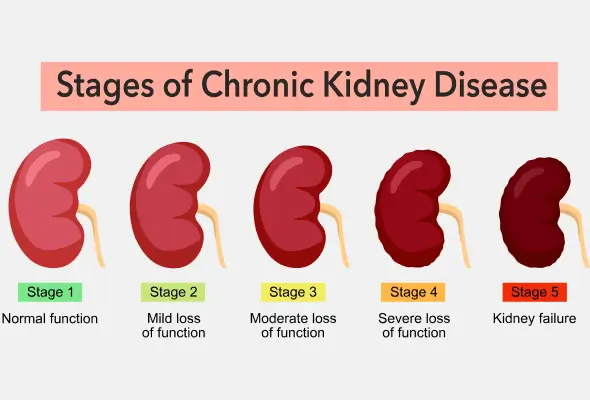-
Doctors
-
Specialities & Treatments
Centre of Excellence
Specialties
Treatments and Procedures
Hospitals & Directions HyderabadCARE Hospitals, Banjara Hills CARE Outpatient Centre, Banjara Hills CARE Hospitals, HITEC City CARE Hospitals, Nampally Gurunanak CARE Hospitals, Musheerabad CARE Hospitals Outpatient Centre, HITEC City CARE Hospitals, Malakpet
HyderabadCARE Hospitals, Banjara Hills CARE Outpatient Centre, Banjara Hills CARE Hospitals, HITEC City CARE Hospitals, Nampally Gurunanak CARE Hospitals, Musheerabad CARE Hospitals Outpatient Centre, HITEC City CARE Hospitals, Malakpet Raipur
Raipur
 Bhubaneswar
Bhubaneswar Visakhapatnam
Visakhapatnam
 Nagpur
Nagpur
 Indore
Indore
 Chh. Sambhajinagar
Chh. SambhajinagarClinics & Medical Centers
Book an AppointmentContact Us
Online Lab Reports
Book an Appointment
Consult Super-Specialist Doctors at CARE Hospitals

Chronic Kidney Disease (CKD)
Symptom, Causes, Diagnosis and Treatment
Chronic Kidney Disease
Chronic kidney disease (CKD), also known as chronic renal failure, typically develops slowly over time due to conditions like diabetes or high blood pressure that damage the kidneys. This damage impairs the kidneys' ability to filter waste and excess fluids. As the disease progresses, kidney function continues to decline, often without noticeable symptoms in the early stages. Over time, CKD can lead to serious health complications if not managed effectively.
Stages of Chronic Kidney Disease

Chronic kidney stages are categorized into 5 different stages according to the extent of damage and decrease in kidney function, which is as follows:
- Stage 1: Kidney damage with normal or high GFR, 90 or above.
- Stage 2: Kidney damage with mild reduction in GFR, 60-89.
- Stage 3: Moderate reduction in GFR, 30-59.
- Stage 4: Severe reduction in GFR, 15-29.
- Stage 5: End-stage chronic kidney failure: GFR < 15—kidney failure.
Chronic Kidney Disease Symptoms
The symptoms of CKD can be subtle in the early stages and become more noticeable as the disease progresses. Common symptoms include:
- Fatigue, loss of energy, and weakness
- Swelling in legs, ankles, feet, and hands
- Difficulty in breathing
- Nausea and vomiting
- Loss of appetite
- Persistent itching
- Puffy eyes.
- Alterations in frequency of urination-increased or decreased and dark-colored urine
- Urine frothy or foamy
- Muscle cramps
- Insomnia and inability to concentrate.
- Severe hypertension
- Your skin color changes.
Chronic Kidney Disease Causes
High blood pressure (hypertension) and diabetes are the two most common causes of chronic kidney disease. Other causes and conditions that affect kidney function and can cause chronic kidney disease include:
- Glomerulonephritis: Inflammation of the kidney's filtering units.
- Polycystic Kidney Disease: A genetic disorder causing cysts to form in the kidneys.
- Prolonged use of NSAIDs: Long-term use of nonsteroidal anti-inflammatory drugs can harm the kidneys.
- Recurrent Kidney Infections: Frequent infections can cause kidney damage.
- Diabetes-related nephropathy: This occurs when diabetes leads to damage or failure of one or more nerves.
- Vesicoureteral reflux: In this situation, urine runs from your kidneys back up your ureters.
- Membranous nephropathy: This is a condition when the waste-filtering kidney membranes are attacked by your body's immune system.
Diagnosing chronic kidney disease
Prior to starting any treatment, your doctor will review your medical history, perform a physical exam, inquire about any current medications you are taking, and ask about any symptoms you have had. Other diagnostic tests involves:
- Blood Tests: The levels of waste products, such as creatinine and urea, are monitored.
- Urine Tests: To detect abnormality in urine that results in excretion of protein or blood.
- Imaging Tests: Ultrasonography or CT scan can be performed to visualize kidneys and their anatomy.
- Kidney Biopsy: In some cases, a small sample of kidney tissue is examined under a microscope.
Treatment for Chronic Kidney Disease
There is no cure for chronic kidney disease; however, it can be managed. The primary goal for the treatment of chronic kidney disease is to slow down the progress of the disease and manage symptoms. The cure for Chronic Kidney Disease includes:
- Medications: Treatment can be given to control blood pressure, blood sugar level.
- Dietary Changes: Reducing salt, protein, and potassium levels reduce pressure on the kidneys.
- Dialysis: In advanced disease, dialysis may be necessary to remove waste products from the circulation.
- Kidney Transplant: A kidney transplant can be required if chronic kidney disease reaches an advanced stage.
Risk Factors
Certain factors increase the risk of developing CKD:
- Diabetes and high blood pressure
- Family history
- Older age, more common in people over 60
- Obesity
- Smoking
- Abnormal kidney structure
Complications
Your entire body may be impacted by chronic kidney disease. Potential side effects of chronic kidney disease:
- Heart disease
- Bone weakness
- Anemia
- Fluid retention
- Electrolyte imbalance
- A sudden spike in blood potassium levels
- Decreased immune response
- Problems during pregnancy
- Pericarditis, an inflammation of the sac-like membrane that surrounds the heart.
When to See a Doctor
If one is suffering from persistent fatigue, swelling, alteration in the pattern of urination, or high blood pressure, he/she should seek immediate medical attention. Early detection can make a big difference in the management of the disease.
Prevention
To lower your chances of having kidney disease:
- Keep your blood pressure and blood sugar levels in check
- Maintain healthy weight
- Avoid smoking
- Stay hydrated
Conclusion
Chronic kidney disease gets worse over time and can affect your quality of life. To manage it better, it's important to focus on preventing the disease and identifying it early. This helps reduce its effects and improve outcomes for those affected. Staying healthy and getting regular checkups are key to keeping your kidneys healthy.
FAQs
Q1. How common is Chronic Kidney Disease?
Ans. It is estimated that chronic kidney disease affects about 10% of the global population. It continues to grow in an aging population, with rising rates of diabetes and hypertension—certainly a major public health concern globally.
Q2. What foods are bad for the kidneys?
Ans. Foods high in sodium, processed meat, sugar-sweetened beverages, high-phosphorus foods— such as, certain dairy products and nuts, and foods with a high content of potassium—for instance, bananas and oranges, could be hazardous to the kidneys, particularly in the presence of chronic kidney disease.
Q3. Can you fully recover from CKD?
Ans. No, CKD cannot be completely cured. However, progression could be managed and slowed with proper treatment and changes in lifestyle and medications that can improve the quality of life and kidney function.
Q4. How do I check if my kidneys are ok?
Ans. You need to consult with a doctor. The doctor will prescribe tests for blood, urine, and probably imaging tests to see that your kidneys are working healthily. The tests will show how well the kidneys work and if there is any abnormality or evidence of chronic kidney disease.
Q5. What color is urine when your kidneys are failing?
Ans. One of the signs when your kidneys are not functioning is that your urine becomes dark, almost brown, red, or tea-colored. Many times, this is also indicative that blood or excess waste is present in the urine. In addition, it may be foamy or cloudy if you have too much protein or other things that really shouldn't be in your urine.
Still Have a Question?




